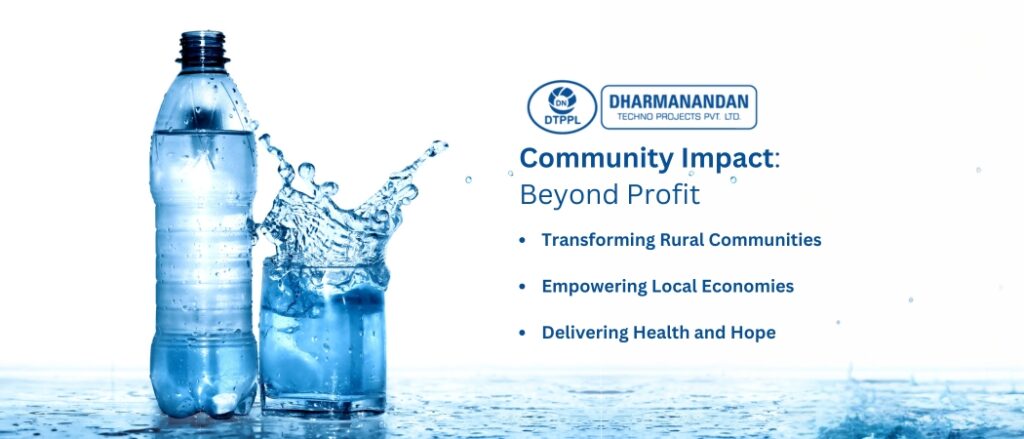
Table of Contents
The Future of Mineral Water Plants in Russia: Opportunities in a Vast Market
December 17, 2024
Russia, the largest country in the world, is a land of extremes. From the frozen tundra of Siberia to the bustling metropolises of Moscow and St. Petersburg, water is both a symbol of abundance and a source of scarcity. Despite vast natural water reserves, clean and safe drinking water remains a significant challenge in many regions. As consumers increasingly demand high-quality, safe packaged water, the opportunities for mineral water plants in Russia are immense, opening doors for innovation and growth.
But this isn’t just a story of business—it’s a story of resilience, vision, and a commitment to addressing a basic human need in one of the world’s most dynamic markets.
1. The Pain of Water Inequality
Imagine a family in a remote village in Siberia, where the rivers are pristine but access to clean drinking water is rare. Despite living near natural water sources, contamination from outdated infrastructure often makes water unsafe for consumption. In urban areas, where water treatment facilities are better equipped, many still prefer packaged water due to concerns about tap water quality.
This dual reality highlights the need for a robust network of mineral water plants capable of meeting the country’s diverse demands. The emotional toll of worrying about whether the water you drink will harm your health is a driving force behind the growing demand for packaged water.
2. Opportunities in a Booming Market
The demand for packaged water in Russia has grown exponentially in recent years, driven by health-conscious consumers and a rising middle class. Establishing a mineral water plant in Asia or Europe requires understanding the nuances of the market, and Russia is no different. The country’s vast geography presents logistical challenges, but it also offers unique opportunities for local production to cater to regional needs.
For entrepreneurs and investors, the question is not whether the market is ripe but how to navigate the mineral water business effectively. With the right approach, the potential for profit and societal impact is enormous.
3. The Financial Challenge: Mineral Water Plant Costs
Starting a mineral water plant in Russia comes with significant financial hurdles. The cost of setting up a mineral water plant includes land acquisition, infrastructure, machinery, and compliance with strict regulatory standards. Entrepreneurs must also factor in regional variations, as setting up in remote areas often incurs higher transportation and operational costs.
Despite these challenges, the potential return on investment is compelling. Many entrepreneurs find that the satisfaction of contributing to public health outweighs the financial stress, especially as demand for clean, safe water continues to grow.

4. Advanced Technology: A Game-Changer
Modern mineral water machines are revolutionizing water production in Russia. Plants equipped with advanced filtration, UV sterilization, and automated bottling systems can produce high-quality water while maintaining efficiency. These innovations are essential for meeting the stringent quality standards set by Russian authorities and satisfying increasingly discerning consumers.
For instance, using a mineral water bottle filling machine not only speeds up production but also ensures that each bottle is filled with precision and care. The investment in such technology might be high, but the long-term benefits—both in terms of quality and cost-efficiency—make it worthwhile.
5. Market Research & Brand Development
Success in the mineral water industry requires more than just production; it also hinges on understanding the market and presenting a strong brand identity.
- Insights into the Bottle Market and Consumer Preferences: Conducting research into consumer trends, preferences for bottle design, and packaging materials ensures your product appeals to the target audience.
- Brand Strategy Development: Developing a cohesive brand strategy, including designing bottles, creating appealing labels, and crafting an impactful logo, is key to standing out in a crowded market.
- Attention-Grabbing Packaging: Innovative and eco-friendly packaging not only attracts consumers but also builds trust and enhances the perceived value of the product.
6. Navigating Regulatory Challenges
Setting up a mineral water plant project in Russia requires navigating a complex regulatory landscape. Entrepreneurs must obtain multiple licenses, conduct thorough water quality testing, and comply with environmental regulations. The process can be overwhelming, but it’s a necessary step to ensure consumer trust and product safety.
For many business owners, the stress of meeting these requirements is balanced by the pride of producing a product that improves lives. Knowing that your bottled water meets the highest standards is not just a regulatory achievement—it’s a moral victory.
7. Community Impact: Beyond Profit
The impact of mineral water plants extends far beyond profits. In rural areas of Russia, these plants create jobs, boost local economies, and provide reliable access to safe drinking water. Families no longer need to worry about contaminated sources, and schools and hospitals benefit from a steady supply of clean water.
One such plant in the southern region transformed a struggling community. By hiring local workers and sourcing materials regionally, the plant became a symbol of hope and progress. The emotional reward of seeing a community thrive because of clean water is one of the most fulfilling aspects of this business.

8. The Environmental Responsibility
As the world moves toward sustainable practices, mineral water plants in Russia must also adapt. Many new facilities are incorporating eco-friendly packaging, water recycling systems, and renewable energy sources. These efforts not only reduce the environmental impact but also appeal to eco-conscious consumers.
The cost of these green initiatives can be high, but they are essential for long-term success. A plant that prioritizes sustainability is not just producing water—it’s building trust and loyalty among its customers.
9. The Future of the Market
The future of the mineral water industry in Russia is bright. With advancements in technology and increasing consumer awareness, the demand for high-quality, safe, and sustainable water is set to grow. Entrepreneurs who invest wisely in infrastructure, technology, and sustainability will not only meet this demand but also set new benchmarks for the industry.
The vastness of Russia’s market is both a challenge and an opportunity. By focusing on regional production and leveraging local resources, businesses can thrive while making a significant impact on public health and well-being.
Overcoming Challenges in Russia’s Mineral Water Industry: DTPPL’s Tailored Solutions
As the mineral water industry in Russia evolves, businesses face unique challenges. DTPPL offers innovative solutions to address these hurdles effectively:
- Challenge: High Initial Investment in Machinery and Infrastructure
- Solution: DTPPL provides cost-efficient, state-of-the-art machinery and flexible payment options, ensuring businesses can set up without financial strain while maintaining quality and efficiency.
- Challenge: Navigating Complex Regulatory Standards
- Solution: DTPPL offers expert guidance in compliance, including water testing, licensing, and adherence to environmental standards, streamlining the setup process for entrepreneurs.
- Challenge: Building a Distinct Brand in a Competitive Market
- Solution: DTPPL supports brand development by providing innovative bottle design options and packaging solutions that cater to consumer preferences and sustainability trends.
- Challenge: Ensuring Operational Efficiency Across Vast Geographies
- Solution: DTPPL delivers customized solutions, such as modular plant designs and advanced automation, enabling businesses to optimize operations regardless of their location in Russia.
By addressing these challenges with tailored solutions, DTPPL empowers entrepreneurs to thrive in the dynamic Russian market while contributing to public health and sustainability.


Conclusion: Seizing the Opportunity
The story of mineral water plants in Russia is one of transformation and potential. From addressing water inequality to creating jobs and promoting sustainability, these plants are more than just factories—they are lifelines for millions. For entrepreneurs and investors ready to make a difference, the opportunities are as vast as the Russian landscape.
If you’re inspired to be part of this journey, partnering with an expert is the first step. DTPPL, a trusted manufacturer and supplier of mineral water plants, offers cutting-edge technology and tailored solutions to help you succeed in this thriving market. Contact DTPPL today to turn your vision into reality and become a key player in Russia’s mineral water revolution.
About Author

Director – Global Marketing and Sales
Mr. Bhavesh from Dharmanandan Techno Projects Pvt. Ltd. has played a pivotal role in elevating the DTPPL brand to the global stage, leveraging his exceptional expertise in marketing and communications. He is committed to helping clients achieve significant growth while strengthening their own brands. Dharmanandan Techno Projects Pvt. Ltd. is a leading manufacturer and supplier of water purification systems and turnkey solutions for mineral water plants. With years of experience in designing and delivering high-quality water treatment solutions, the company provides end-to-end services, including system design, installation, maintenance, and ongoing support. Specializing in scalable and customizable water plants, DTPPL has successfully served industries worldwide, ensuring clean and safe drinking water across diverse applications.




